|
|
|
Sort Order |
|
|
|
Items / Page
|
|
|
|
|
|
|
| Srl | Item |
| 1 |
ID:
120463
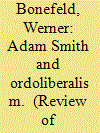

|
|
|
|
|
| Publication |
2013.
|
| Summary/Abstract |
In the context of the contemporary crisis of neoliberal political economy, the politics of austerity has reasserted the liberal utility of the state as the political authority of market freedom. This article argues that economy has no independent existence, and that instead, economy is a political practice. It examines the political economy of Adam Smith and the German ordoliberal tradition to decipher the character of the political in political economy and its transformation from Smith's liberal theory into neoliberal theology. Ordoliberalism emerged in the late 1920s at a time of a manifest crisis of political economy, and its argument was fundamental for the development of the neoliberal conception that free economy is matter of strong state authority. The conclusion argues with Marx that the state is the concentrated force of free economy.
|
|
|
|
|
|
|
|
|
|
|
|
|
|
|
|
| 2 |
ID:
181127
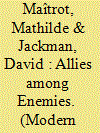

|
|
|
|
|
| Summary/Abstract |
The authority of political leaders in Bangladesh rests on diverse qualities, not least of which are the muscle and finance they can mobilize, and the relationships they can craft with senior party members. These are utilized to confront rivals both within and outside their own party. In some instances, the intensity of intra-party competition can be so severe that a further quality emerges: the capacity to find allies among enemies. Building local inter-party alliances can bolster the authority of politicians, yet be to the detriment of party coherence. This argument is developed through an analysis of mayoral and parliamentary elections held in the past decade in a small Bangladeshi city, where a ruling party member of parliament (MP) and opposition mayor appear to have developed such a relationship. This has thwarted the electoral ambitions of their fellow party members and has posed a serious challenge to party discipline. While political competition is often seen as being either inter- or intra-party, here it is focused around inter-party alliances. This portrayal suggests we need to give greater emphasis to the decentralized and local character that political authority can take in Bangladesh.
|
|
|
|
|
|
|
|
|
|
|
|
|
|
|
|
| 3 |
ID:
153261
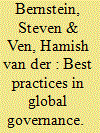

|
|
|
|
|
| Summary/Abstract |
Best practices are increasingly used to govern a range of global issues. Yet, the rise of global governance through best practices has received scant attention in the International Relations literature. How do best practices differ from other modes of governance? How are they constructed? And to what end? We offer a novel conceptualisation of best practices as a unique mode of global governance principally distinguished by basing claims of political authority on existing practices. Belying their apolitical terminology, best practices in global governance are purposively constructed by political actors to steer targeted actors toward desired ends. We illustrate the characteristics of governance through best practices with reference to state and non-state global governance initiatives in a wide range of issue areas, ranging from finance and development to human rights and the environment, and through an in-depth case study of the ISEAL Alliance, a disseminator of best practices for transnational sustainability standard-setters. We find that governance through best practices has both positive and negative consequences. While it offers a pragmatic approach to global governance under conditions of fragmentation and polycentricity, it can also mask underlying power dynamics and political agendas and therefore requires ongoing critical scrutiny.
|
|
|
|
|
|
|
|
|
|
|
|
|
|
|
|
| 4 |
ID:
131467
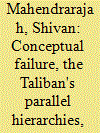

|
|
|
|
|
| Publication |
2014.
|
| Summary/Abstract |
ISAF exists to protect the Afghan constitutional model. This strategic objective will be defeated because the GIRoA model has a conceptual flaw that renders it incapable of delivering governance at the local level (Tier IV). This fatal flaw has enabled the Taliban, by developing parallel hierarchies, to displace GIRoA and establish itself in southern locales as the political authority. The Taliban are fighting a revolutionary war, a Maoist displacement strategy that uses guerrilla tactics to advance a political program. Petraeus and McChrystal failed to recognize the character of war, and believed the Taliban are pursuing an exhaustion strategy. They failed to devise a counter-RW strategy. The 'Surge' was doomed ab initio
|
|
|
|
|
|
|
|
|
|
|
|
|
|
|
|
| 5 |
ID:
152730
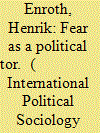

|
|
|
|
|
| Summary/Abstract |
In past decades, social and cultural theory as well as international relations theory and political theory have been preoccupied with the subject of fear. In this article, I return the conversation about fear as a political factor to what may be the oldest subject in the book: the connection between fear and political authority. Today, I suggest, we are in the midst of a shift in our understanding of this relationship, prompted not least by efforts to come to terms, analytically and politically, with the challenges of climate change. The article seeks to get a clearer view of this shift by identifying and analyzing three distinct stories in academic and public discourse about fear and political authority. By way of conclusion, I venture that these mutations in our ways of thinking, speaking, and feeling about political authority and fear point toward a model of political authority for post-sovereign conditions.
|
|
|
|
|
|
|
|
|
|
|
|
|
|
|
|
| 6 |
ID:
168264
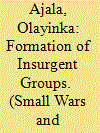

|
|
|
|
|
| Summary/Abstract |
Contrary to earlier notions that religious diversity, ethnicity and the lack of economic development are the main factors responsible for the surge of violence in Nigeria, this article argues that the means of attaining or retaining political authority by politicians are responsible for violent conflicts and the formation of insurgent groups. Using theories of patrimonialism and prebendalism, the article argues that political power and authority are often channelled for personal use in a predatory manner that results in the formation of insurgent groups. The aim of this article is to proffer a different analytical framework for the understanding of the formation of insurgent groups based on political authority.
|
|
|
|
|
|
|
|
|
|
|
|
|
|
|
|
| 7 |
ID:
123140
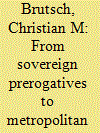

|
|
|
|
|
| Publication |
2013.
|
| Summary/Abstract |
What roles do, can and should cities and their agents play on the international stage? Has the "rescaling" of political authority expanded urban governments' foreign policy space? Can the advocates of urban empowerment exploit cities' growing economic clout to harness urban development? To answer these questions, and to shed light on the international frontiers of metropolitan governance, this study explores the frictions between cities' foreign ambitions and states' collective efforts to preserve their sovereign rights and prerogatives. It proceeds in two parts: to probe the anarchical society's stake in the urban age, the first part maps the transnational activities of cities and their agents. It discusses urban aspirations, surveys foreign engagements and reviews their salience and limitations. To gauge states' collective response to the tentative expansion of metropolitan rule, the second part examines on what terms UN-Habitat, the Cities Alliance and the World Bank harness urban development in poorer and more fragile parts of the world. The study concludes with a critique of the view that international relations are bound to orbit local concerns.
|
|
|
|
|
|
|
|
|
|
|
|
|
|
|
|
| 8 |
ID:
115198
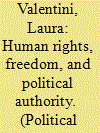

|
|
|
|
|
| Publication |
2012.
|
| Summary/Abstract |
In this article, I sketch a Kant-inspired liberal account of human rights: the freedom-centred view. This account conceptualizes human rights as entitlements that any political authority-any state in the first instance-must secure to qualify as a guarantor of its subjects' innate right to freedom. On this picture, when a state (or state-like institution) protects human rights, it reasonably qualifies as a moral agent to be treated with respect. By contrast, when a state (or state-like institution) fails to protect human rights, it loses its moral status and becomes liable to both internal and external interference. I argue that this account not only steers a middle course between so-called natural-law and political approaches to human rights but also satisfies three important theoretical desiderata-explanatory power, functional specificity, and critical capacity.
|
|
|
|
|
|
|
|
|
|
|
|
|
|
|
|
| 9 |
ID:
120412
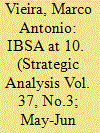

|
|
|
|
|
| Publication |
2013.
|
| Summary/Abstract |
This commentary engages with the IBSA model of South-South development assistance. It focuses on the IBSA Trust Fund to demonstrate the growing political relevance of the partnership in development assistance initiatives. This is followed by an analysis of Brazil's increasing participation in South-South development assistance in many developing countries around the world. I argue that the strategic mission for the IBSA states in the coming decades, as a new normative/ordering power in international relations, is to further its political authority and legitimacy by expanding and refining its South-South development assistance framework. This can be done by integrating new thinking on environmental sustainability as a central-albeit neglected-pillar of their common framework.
|
|
|
|
|
|
|
|
|
|
|
|
|
|
|
|
| 10 |
ID:
107935
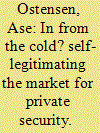

|
|
|
|
|
| Publication |
2011.
|
| Summary/Abstract |
Private military and security companies have gained political authority within the governance of security, but the increasing authority seems unmatched by legitimacy. This article analyzes self-legitimation efforts by the dominant Western industry. It draws on two different theoretical perspectives of legitimacy, organizational legitimacy and democratic legitimacy, and argues that four dimensions of legitimacy are relevant to these companies. The article finds empirically that there are different degrees of deficits in each dimension and discusses the use of some corresponding legitimating strategies used by the industry. Findings indicate that much effort currently seems concentrated on building input legitimacy, while there are also less concerted efforts to cultivate both output and moral legitimacy. The article warns that, if unchallenged, legitimation campaigns may lead to further accumulation of private influence on military and security policies, both nationally and internationally.
|
|
|
|
|
|
|
|
|
|
|
|
|
|
|
|
| 11 |
ID:
129836
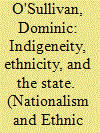

|
|
|
|
|
| Publication |
2014.
|
| Summary/Abstract |
This article draws on the politics of indigeneity to distinguish the claims of first occupancy from simple ethnic identity politics, illustrating that relative political marginalization in Australasia is not so much a function of minority status but of indigeneity itself. The politics of indigeneity's aim is to create political space for self-determination and a particular indigenous share in the sovereign authority of the nation-state itself. The Australasian states are compared with Fiji to demonstrate that the significance of historical constraints on political authority transcend the withdrawal of a colonial power and the restoration of collective indigenous majority population status.
|
|
|
|
|
|
|
|
|
|
|
|
|
|
|
|
| 12 |
ID:
126587
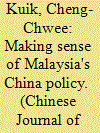

|
|
|
|
|
| Publication |
2013.
|
| Summary/Abstract |
Using Malaysia's China policy as a case study of a smaller state's response to a rising power, this article challenges the mainstream neorealist notion that the growing capability and geographical proximity of a rising power tend to induce fear among its weaker neighbours. By tracing the transformation of Malaysia's China policy, the article's findings indicate that power asymmetry and geographical proximity have no inherent logic of their own; rather, whether and to what extent the two variables will prompt smaller states to become fearful and/or attracted to a rising power is often a function of intervening factors at the domestic level, i.e. the imperative of ruling elite's domestic legitimation. In the case of Malaysia's China policy, it is the ruling Barisan Nasional elite's desire to capitalize on the big power's rise-for the ultimate goal of enhancing and justifying its political authority at home-that has driven the smaller state to adopt a hedging approach characterized by an inclination to prioritize immediate economic and diplomatic benefits over potential security concerns, while simultaneously attempting to keep its strategic options open for as long as the systemic conditions allow.
|
|
|
|
|
|
|
|
|
|
|
|
|
|
|
|
| 13 |
ID:
134138
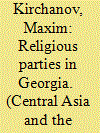

|
|
|
|
|
| Publication |
2014.
|
| Summary/Abstract |
The Georgian Apostolic Autocephalous Orthodox Church plays a significant role in the political and intellectual life of Georgian society. Religious parties are active in Georgia's political landscape. The ideologues and theorists of clerical parties are developing ideas and concepts of Georgian political nationalism and supporting the Georgian language and identity. The ideology of the clerical parties in Georgia is of a mixed nature. The religious parties are developing ideas of political traditionalism. Georgian conservative theorists also support liberal theories in the economic sphere. Political instability is promoting an increase in the moral and political authority of the Church in Georgia. The prospects for the development and transformation of clerical parties are vague and still uncertain.
|
|
|
|
|
|
|
|
|
|
|
|
|
|
|
|
| 14 |
ID:
131011
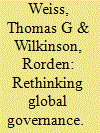

|
|
|
|
|
| Publication |
2014.
|
| Summary/Abstract |
Global governance remains notoriously slippery. While the term arose to describe change in the late twentieth century, its association with that specific moment has frozen it in time and deprived it of analytical utility. It has become an alternative moniker for international organizations, a descriptor for an increasingly crowded world stage, a call to arms, an attempt to control the pernicious aspects of globalization, and a synonym for world government. This article aims not to advance a theory of global governance but to highlight where core questions encourage us to go. A more rigorous conception should help us understand the nature of the contemporary phenomenon as well as look "backwards" and "forwards." Such an investigation should provide historical insights as well as prescriptive elements to understand the kind of world order that we ought to be seeking and encourage us to investigate how that global governance could be realized.
|
|
|
|
|
|
|
|
|
|
|
|
|
|
|
|
| 15 |
ID:
127780
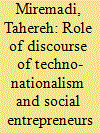

|
|
|
|
|
| Publication |
2014.
|
| Summary/Abstract |
This paper discusses the role of social entrepreneurship and the discourse of techno-nationalism in defining national selfhood in contemporary Iran. To examine the issue, this paper develops an in-depth case study of the development of stem cell research, and shows how an alliance between the leaders of the scientific community and Iran's politico-religious authority contributed to building technological capacity in the field of stem cell research in the first decade of the twenty-first century. The paper also highlights how the preliminary success of stem cell research, along with other knowledge-intensive technologies, has created a shared feeling of national pride and has served as the material base for the contemporary discourse of techno-nationalism. The paper concludes with the notion that the techno-nationalist discourse has the inherent potential to unwittingly help to redefine the dichotomy between Iran and the West in such a way that it becomes less antagonistic, should other factors permit.
|
|
|
|
|
|
|
|
|
|
|
|
|
|
|
|
| 16 |
ID:
131902
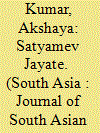

|
|
|
|
|
| Publication |
2014.
|
| Summary/Abstract |
Avatar
Film Star
Political Surplus
Truth
Entertainment
News
Crime
Cultural Economy
Moral Authority
Political Authority
Aamir Khan
Narrative Ingenuity
Politics
Social Changes
Trope
Social System
Social Reforms
|
|
|
|
|
|
|
|
|
|
|
|
|
|
|
|
|
|
|
|
|